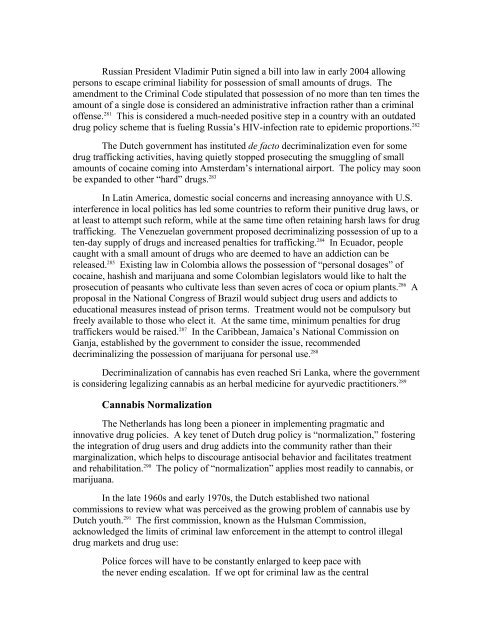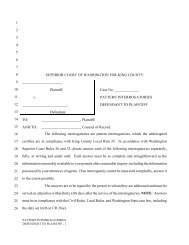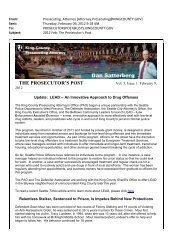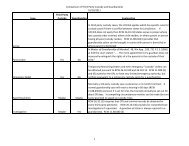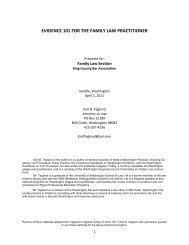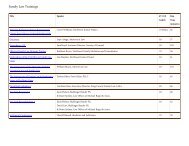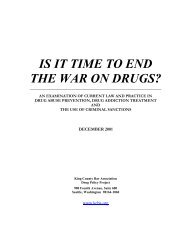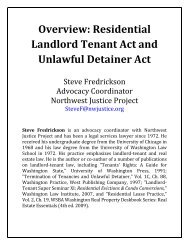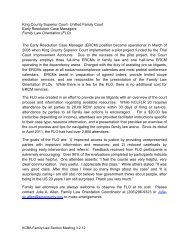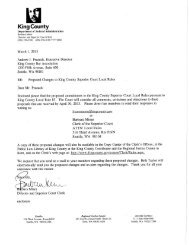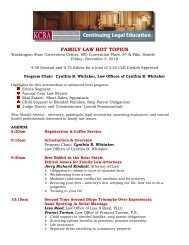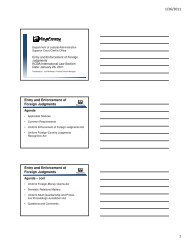Effective Drug Control: Toward A New Legal Framework
Effective Drug Control: Toward A New Legal Framework
Effective Drug Control: Toward A New Legal Framework
Create successful ePaper yourself
Turn your PDF publications into a flip-book with our unique Google optimized e-Paper software.
Russian President Vladimir Putin signed a bill into law in early 2004 allowing<br />
persons to escape criminal liability for possession of small amounts of drugs. The<br />
amendment to the Criminal Code stipulated that possession of no more than ten times the<br />
amount of a single dose is considered an administrative infraction rather than a criminal<br />
offense. 281 This is considered a much-needed positive step in a country with an outdated<br />
drug policy scheme that is fueling Russia’s HIV-infection rate to epidemic proportions. 282<br />
The Dutch government has instituted de facto decriminalization even for some<br />
drug trafficking activities, having quietly stopped prosecuting the smuggling of small<br />
amounts of cocaine coming into Amsterdam’s international airport. The policy may soon<br />
be expanded to other “hard” drugs. 283<br />
In Latin America, domestic social concerns and increasing annoyance with U.S.<br />
interference in local politics has led some countries to reform their punitive drug laws, or<br />
at least to attempt such reform, while at the same time often retaining harsh laws for drug<br />
trafficking. The Venezuelan government proposed decriminalizing possession of up to a<br />
ten-day supply of drugs and increased penalties for trafficking. 284 In Ecuador, people<br />
caught with a small amount of drugs who are deemed to have an addiction can be<br />
released. 285 Existing law in Colombia allows the possession of “personal dosages” of<br />
cocaine, hashish and marijuana and some Colombian legislators would like to halt the<br />
prosecution of peasants who cultivate less than seven acres of coca or opium plants. 286 A<br />
proposal in the National Congress of Brazil would subject drug users and addicts to<br />
educational measures instead of prison terms. Treatment would not be compulsory but<br />
freely available to those who elect it. At the same time, minimum penalties for drug<br />
traffickers would be raised. 287 In the Caribbean, Jamaica’s National Commission on<br />
Ganja, established by the government to consider the issue, recommended<br />
decriminalizing the possession of marijuana for personal use. 288<br />
Decriminalization of cannabis has even reached Sri Lanka, where the government<br />
is considering legalizing cannabis as an herbal medicine for ayurvedic practitioners. 289<br />
Cannabis Normalization<br />
The Netherlands has long been a pioneer in implementing pragmatic and<br />
innovative drug policies. A key tenet of Dutch drug policy is “normalization,” fostering<br />
the integration of drug users and drug addicts into the community rather than their<br />
marginalization, which helps to discourage antisocial behavior and facilitates treatment<br />
and rehabilitation. 290 The policy of “normalization” applies most readily to cannabis, or<br />
marijuana.<br />
In the late 1960s and early 1970s, the Dutch established two national<br />
commissions to review what was perceived as the growing problem of cannabis use by<br />
Dutch youth. 291 The first commission, known as the Hulsman Commission,<br />
acknowledged the limits of criminal law enforcement in the attempt to control illegal<br />
drug markets and drug use:<br />
Police forces will have to be constantly enlarged to keep pace with<br />
the never ending escalation. If we opt for criminal law as the central


